广东省深圳市宝安区文汇学校2016届中考英语第一轮复习 常考知识点课件2
文档属性
| 名称 | 广东省深圳市宝安区文汇学校2016届中考英语第一轮复习 常考知识点课件2 |  | |
| 格式 | zip | ||
| 文件大小 | 166.0KB | ||
| 资源类型 | 教案 | ||
| 版本资源 | 牛津深圳版 | ||
| 科目 | 英语 | ||
| 更新时间 | 2016-07-07 00:00:00 | ||
图片预览

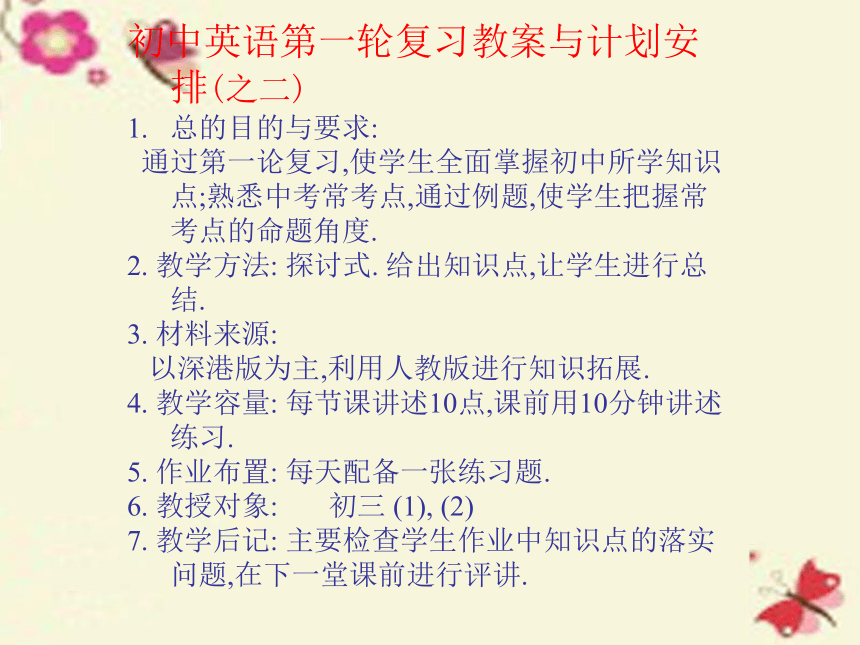
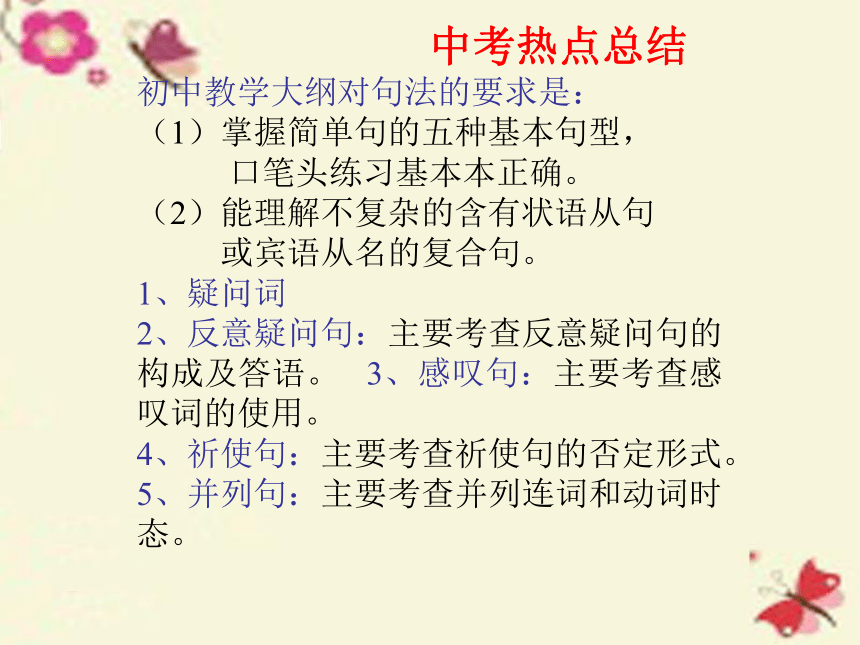
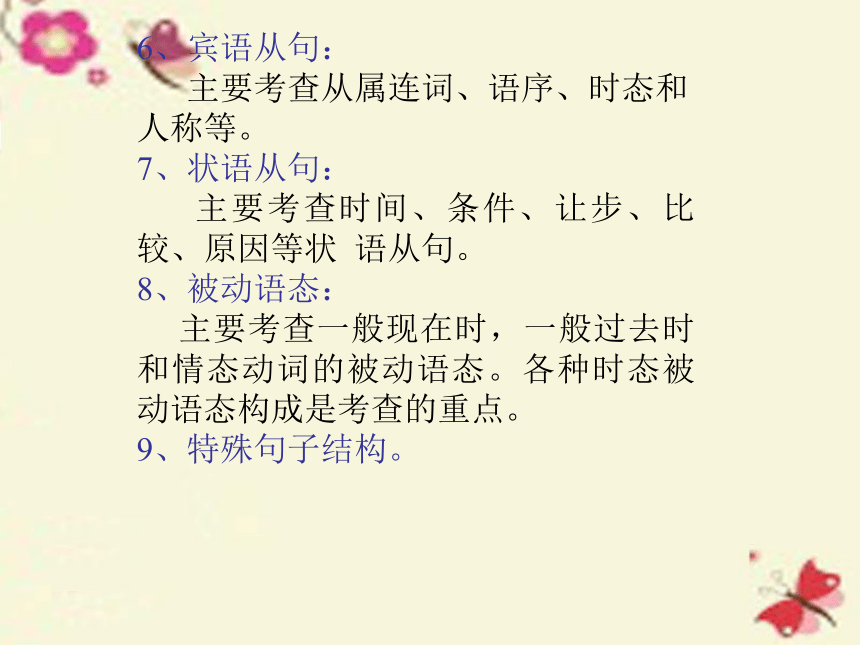
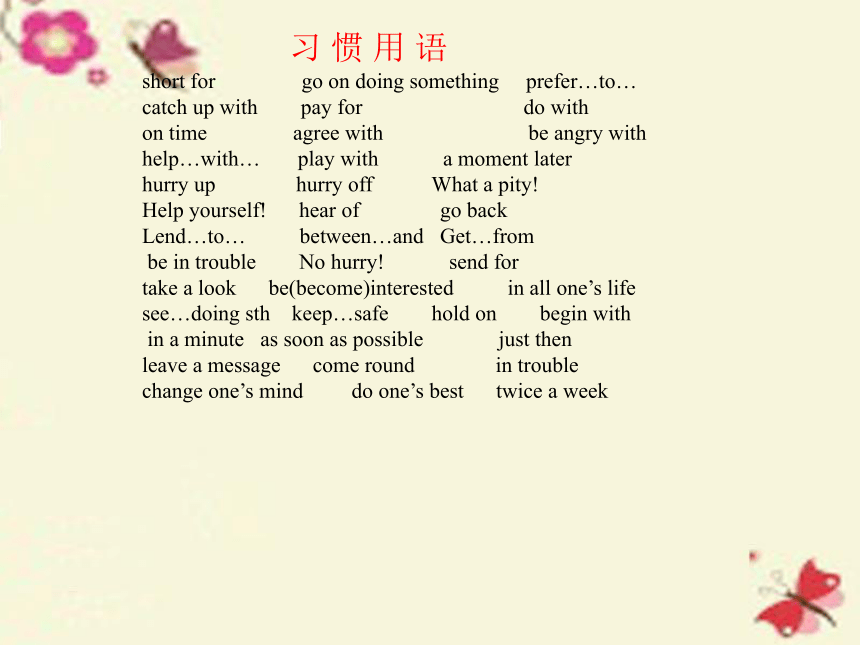
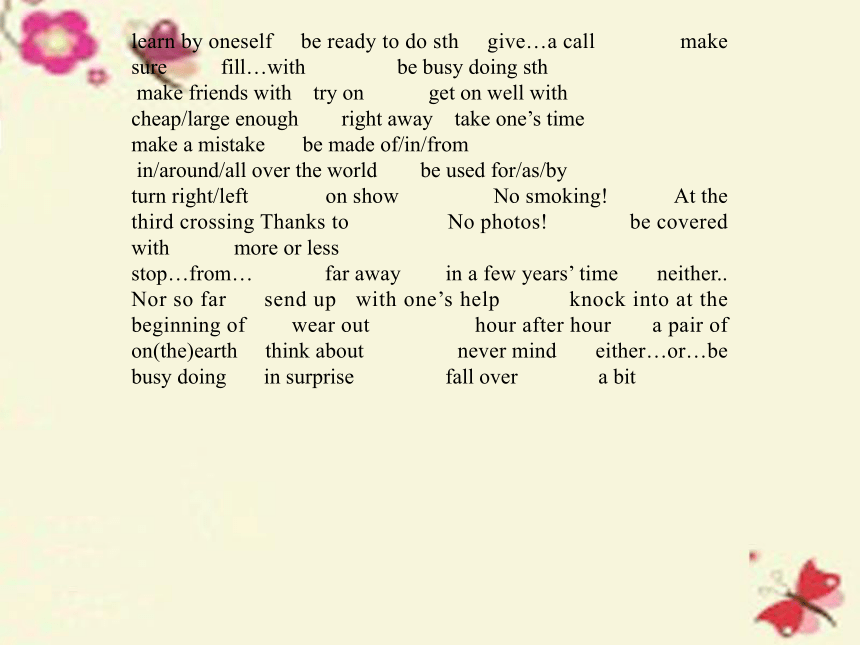
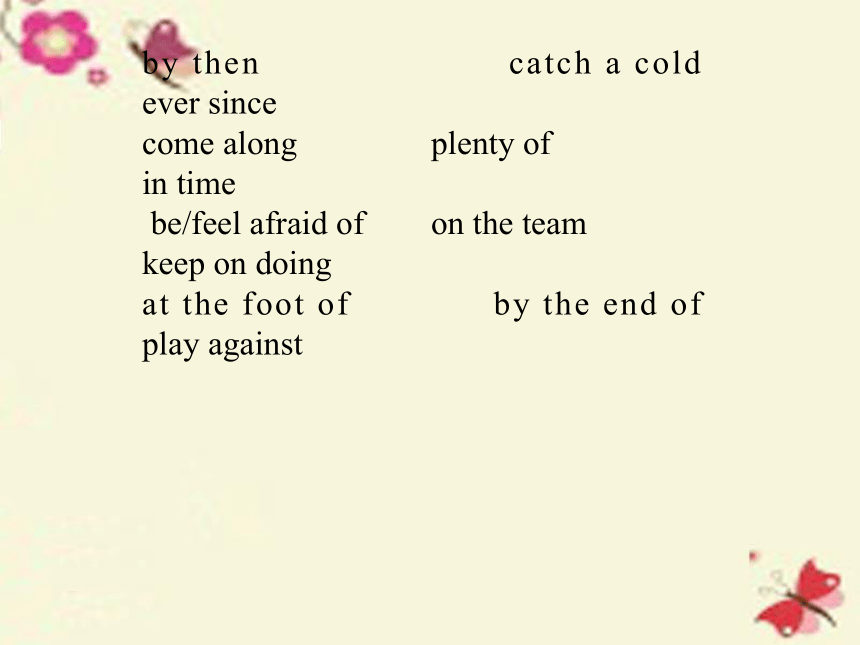
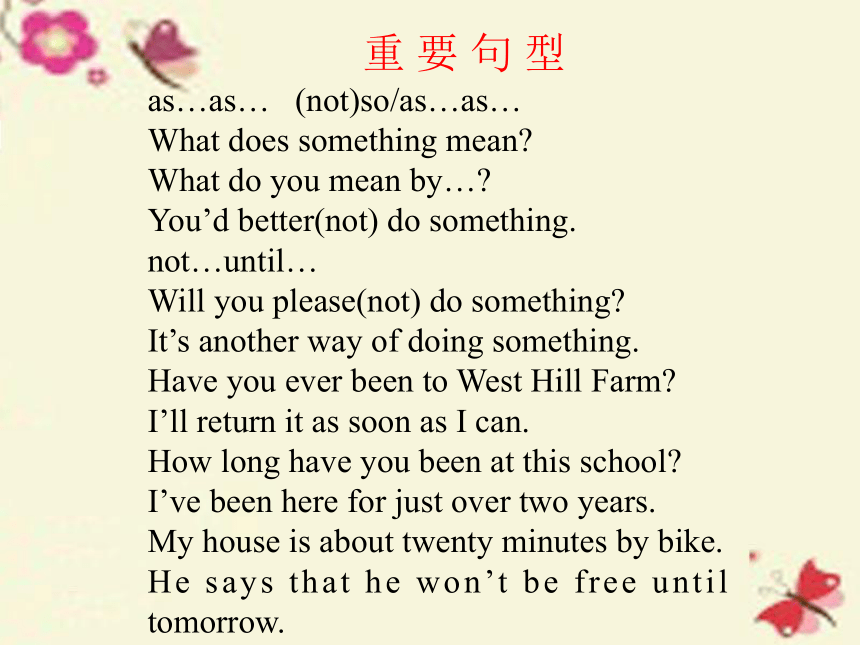
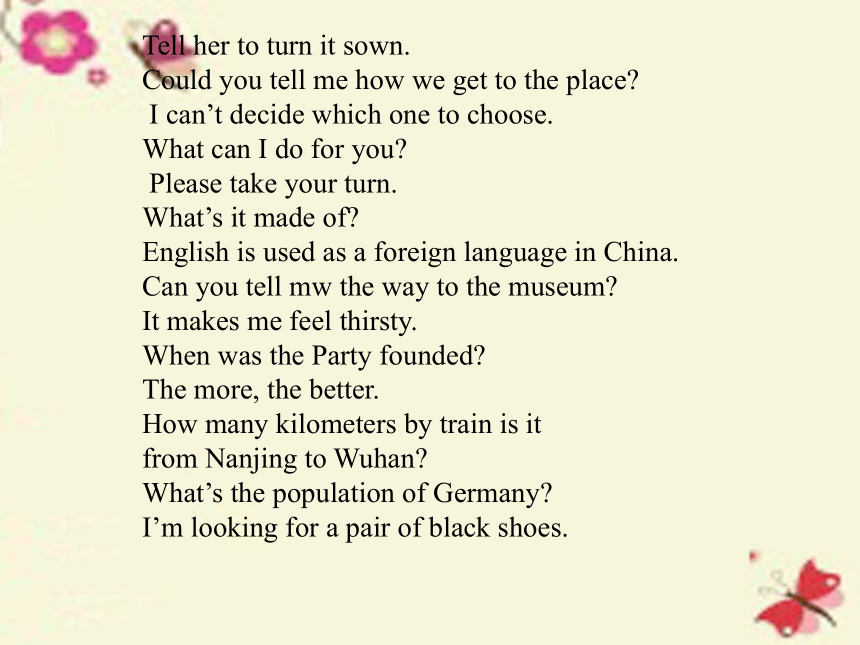
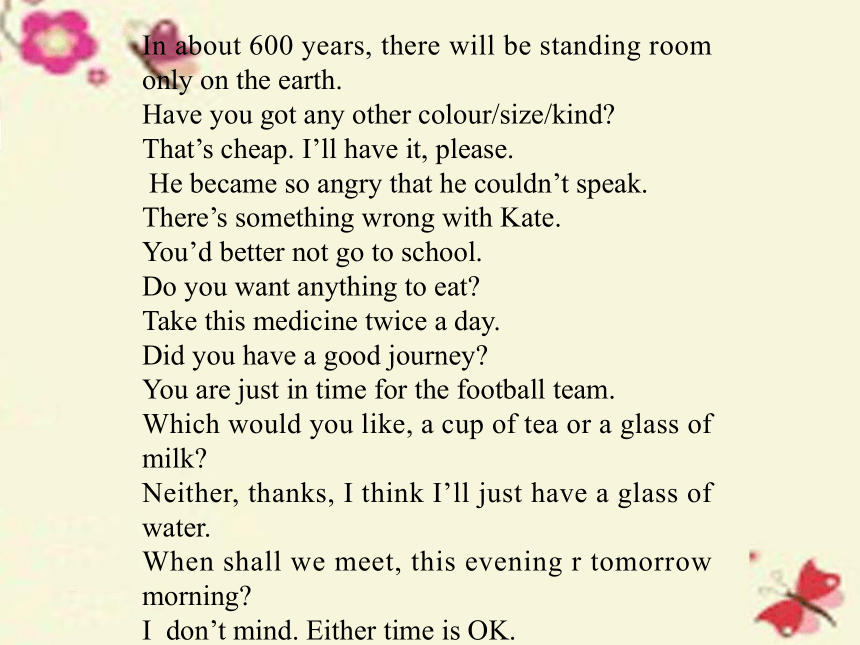
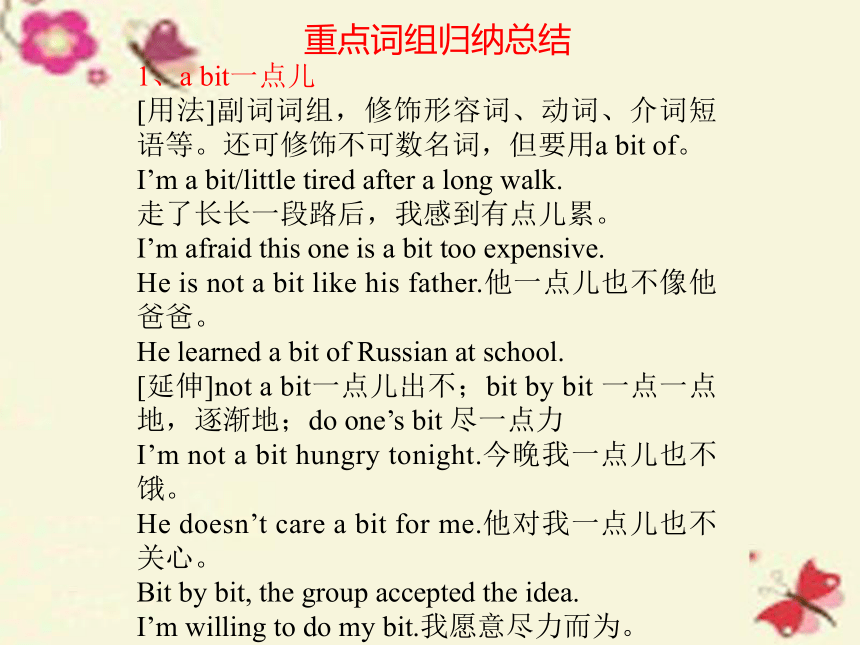

文档简介
课件70张PPT。初中英语第一轮复习
常考知识点 (之二)初中英语第一轮复习教案与计划安排(之二)
总的目的与要求:
通过第一论复习,使学生全面掌握初中所学知识点;熟悉中考常考点,通过例题,使学生把握常考点的命题角度.
2. 教学方法: 探讨式. 给出知识点,让学生进行总结.
3. 材料来源:
以深港版为主,利用人教版进行知识拓展.
4. 教学容量: 每节课讲述10点,课前用10分钟讲述练习.
5. 作业布置: 每天配备一张练习题.
6. 教授对象: 初三 (1), (2)
7. 教学后记: 主要检查学生作业中知识点的落实问题,在下一堂课前进行评讲. 中考热点总结
初中教学大纲对句法的要求是:
(1)掌握简单句的五种基本句型,
口笔头练习基本本正确。
(2)能理解不复杂的含有状语从句
或宾语从名的复合句。
1、疑问词
2、反意疑问句:主要考查反意疑问句的构成及答语。 3、感叹句:主要考查感叹词的使用。
4、祈使句:主要考查祈使句的否定形式。
5、并列句:主要考查并列连词和动词时态。6、宾语从句:
主要考查从属连词、语序、时态和 人称等。
7、状语从句:
主要考查时间、条件、让步、比较、原因等状 语从句。
8、被动语态:
主要考查一般现在时,一般过去时和情态动词的被动语态。各种时态被动语态构成是考查的重点。
9、特殊句子结构。
习 惯 用 语
short for go on doing something prefer…to…
catch up with pay for do with
on time agree with be angry with
help…with… play with a moment later
hurry up hurry off What a pity!
Help yourself! hear of go back
Lend…to… between…and Get…from
be in trouble No hurry! send for
take a look be(become)interested in all one’s life see…doing sth keep…safe hold on begin with
in a minute as soon as possible just then
leave a message come round in trouble
change one’s mind do one’s best twice a weeklearn by oneself be ready to do sth give…a call make sure fill…with be busy doing sth
make friends with try on get on well with
cheap/large enough right away take one’s time
make a mistake be made of/in/from
in/around/all over the world be used for/as/by
turn right/left on show No smoking! At the third crossing Thanks to No photos! be covered with more or less
stop…from… far away in a few years’ time neither.. Nor so far send up with one’s help knock into at the beginning of wear out hour after hour a pair of on(the)earth think about never mind either…or…be busy doing in surprise fall over a bitby then catch a cold ever since
come along plenty of in time
be/feel afraid of on the team keep on doing
at the foot of by the end of play against
重 要 句 型
as…as… (not)so/as…as…
What does something mean?
What do you mean by…?
You’d better(not) do something.
not…until…
Will you please(not) do something?
It’s another way of doing something.
Have you ever been to West Hill Farm?
I’ll return it as soon as I can.
How long have you been at this school?
I’ve been here for just over two years.
My house is about twenty minutes by bike.
He says that he won’t be free until tomorrow.
Tell her to turn it sown.
Could you tell me how we get to the place?
I can’t decide which one to choose.
What can I do for you?
Please take your turn.
What’s it made of?
English is used as a foreign language in China.
Can you tell mw the way to the museum?
It makes me feel thirsty.
When was the Party founded?
The more, the better.
How many kilometers by train is it
from Nanjing to Wuhan?
What’s the population of Germany?
I’m looking for a pair of black shoes. In about 600 years, there will be standing room only on the earth.
Have you got any other colour/size/kind?
That’s cheap. I’ll have it, please.
He became so angry that he couldn’t speak.
There’s something wrong with Kate.
You’d better not go to school.
Do you want anything to eat?
Take this medicine twice a day.
Did you have a good journey?
You are just in time for the football team.
Which would you like, a cup of tea or a glass of milk?
Neither, thanks, I think I’ll just have a glass of water.
When shall we meet, this evening r tomorrow morning?
I don’t mind. Either time is OK. 重点词组归纳总结
1、a bit一点儿
[用法]副词词组,修饰形容词、动词、介词短语等。还可修饰不可数名词,但要用a bit of。
I’m a bit/little tired after a long walk.
走了长长一段路后,我感到有点儿累。
I’m afraid this one is a bit too expensive.
He is not a bit like his father.他一点儿也不像他爸爸。
He learned a bit of Russian at school.
[延伸]not a bit一点儿出不;bit by bit 一点一点地,逐渐地;do one’s bit 尽一点力
I’m not a bit hungry tonight.今晚我一点儿也不饿。
He doesn’t care a bit for me.他对我一点儿也不关心。
Bit by bit, the group accepted the idea.
I’m willing to do my bit.我愿意尽力而为。 2、agree with? 同意某人(或某人的意见)
[用法]表示“同意某人或同意某人的意见”时,
with后还可以跟what从句。另外,它还可以表示
“适合;与…一致或相符”。
I quite agree with you.我非常同意你的意见。
Don’t you agree with what I said and what I did? 难道你不同意我说的话和做的事吗?
Bananas don’t agree with everyone.香蕉并非人人都爱吃。
His explanation agrees with the facts.他的解释与事实相符。
3. as usual 像平常一样;照常;照例
[用法]As usual, he arrived last.他还是老样子,最后一个到。
He takes a shower before breakfast as usual.
[延伸]than usual 较平常
This morning she got up earlier than usual.
今天早上她比往常起得早。 5. all one’s life 一生;终生;终身
[用法]作状语或宾语,相当于one’s whole life。
He remained single all his life.他终生未娶。
He gave all his life to the study of languages.
他把毕生的精力都用在了语言研究上。
6.? arrive in到达;抵达 arrive at到达;抵达
[辨析]二者都有“到达某地”之意,arrive in后常跟较大的地方或终点;arrive at后常跟小地方或途中某地。
When did you arrive in Beijing yesterday?
你昨天什么时候到达北京?
It was dark when we arrived at the airport.
我们到达机场时,天黑了。
6.at the beginning of 在…的起初;在…的开始;
in the beginning起初;开始
[辨析]二者都有“起初,开始”之意,at the beginning of 表示“在…的开始或起初”,of后要带宾语,也可用at the beginning,这时它和in the beginning相同。
in the beginning表示“最初,起初”,常单独使用。
Jane and Rose met for the first time at the beginning of term.简和罗丝在学期之初初次见面。
At/in the beginning, I didn’t quite understand what he said.开始,我不太明白他的话。
In the beginning, there were no men, nor animals, nor plants on the earth.
最初地球上既没有人类,也没有动物,也没有植物。
At the beginning he wasn’t interested in science at all.
起初,他对理科根本不感兴趣。7.be afraid of害怕;担心
[用法]后跟名词、代词或动名词作宾语。
跟从句时,省去of。
Are you afraid of dogs?你怕狗吗?
She is afraid of nothing.她什么都不怕。
I was afraid of making you uneasy then.
当时我恐怕使你感到不安。
He is afraid he will die.他担心自己会死的。
[延伸]be afraid to do 不敢做;be afraid of doing…怕做…; I’m afraid 恐怕(委婉语)
They were afraid of being seen speaking to me.
他们害怕被人发现同我说话。
I am afraid to go home alone at night 夜间我不敢独自回家。
I’m afraid I’m seriously ill, doctor.
医生,恐怕我病得很严重。[警示]
例 She is afraid by his gate because she is afraid by his danger dog.
A. to pass;of being bitten B. to pass;to be bitten
C. of passing; of being bitten D.of passing;to be bitten分析与解答:本题考查be afraid to do 和be afraid of doing的不同含义。be afraid to do 表示主观上觉得不敢或害怕做某事,be afraid of doing表示害怕或担心发生不良的后果。该题的题意是:她不敢从他家门口过,因为她害怕被他的那只可怕的狗咬伤。故选A。 8.be angry at; be angry with
[辨析]二者都有“生气”之意,跟“人”或“物”作宾语时,要用不同的介词。be angry at 也可以换为be angry about.。
Don’t be angry with me for my coming late.
别因为我来迟了而生我的气。
He was very angry at finding that nothing had been done.
当发现什么都没做时,他很生气。
What are you angry about?你生什么气呢?
9、be covered with被…覆盖 be covered by 被…覆盖
[辨析]二者都有“被……覆盖”之意,be covered with强调状态;be covered by强调被动动作。
The little boy’s body was covered with a national flag.
More than 70% of the surface of the earth is covered with water.地球表面的70%以上被水覆盖着。
The well was covered by the villagers.10、be made of 由…制造‖ be made from由…制造
‖be made out of 由…制造‖be made up of由…组成
‖be made in在…地方制造‖be made by被…制造
[辨析]be made of 表示“制成品和原料之间只有大小、形状的变化,没有发生本质变化”,往往从制成品上可以看出原材料;be made from表示“制成品和原料之间发生了质的变化”,从制成品上看不出原材料;be made out of和be made of 或be made from的意思一样,可以与它们换用;be made up of表示“某事物或组织由一些成分或成员构成”;be made in和be made by从意思上就可区分了它们的不同。
The bridge is made of steel.这座桥是钢铁筑成的。
Steel is made from iron.钢是由铁炼成的。This kind of powder is made out of fish, blood and bones.这种肥料是由鱼、血和骨头合成的。
A computer is made up of many small parts.
计算机是由许多小零件组成的。
The “Flying Pigeon”bicycles are made in Tianjin.
飞鸽自行车是天津生产的。
The model plane was made by my boy.
这个飞机模型是我的儿子做的。11、be/become interested in对……感兴趣
[用法]后跟名词、代词或动名词作宾语,用be强调状态,用become侧重动作。表示“对…感兴趣”时,用very(much)或greatly等修饰interested。
We are all very(much)interested in English.我们都对英语非常感兴趣。
You’ll soon become interested in learning languages.你很快就会对学语言感兴趣的。
[延伸]be interested to do 对做……感兴趣,想做……
She is interested to know my personal history.她对我的经历感兴趣。12、be used for被用来作……‖be used as 被用作……
[辨析]二者都有“被使和”之意,be used for表示用途;
be used as 表示目的。
She decided to use it for a gift.
她决定所它用作礼物。
“Water” can be used as a noun or verb.
“Water”一词可以用作名词或动词。
13、by then到那时
[用法]常和将来时态连用。
By then we’ll know the result of the election.
到那时,我们就会知道这次选举的结果。
He should be back by then.
到那时,他就该回来了。
14、catch (a ) cold 伤风;感冒
‖have a cold 伤风;感冒
[辨析]二者都有“伤风;感冒”之意,catch ( a ) cold强调动作,为短暂性动词短语,其中的a可以省略;
have a cold 强调状态,为持续性动词短语,其中的a不可省略。
Put on some warm clothes or you’ll catch (a) cold.
穿一些棉衣,不然你会感冒的。
I was in Japan until recently, but I caught a heavy/bad cold.我一直在日本呆到最近,不过我得了重感冒。
She has had a cold for a week.她感冒一周了。
catch up with…赶上……
You go first, and I’ll catch up with you in a short time.你先走吧,我一会儿就会赶上你的。15、do one’s best 尽力
[用法]不及物动词短语,与try one’s best相当,其后可跟不定式。
Did you do your best in the last exam? I will do my best to complete the work ahead of time. 分析与解答:本题考查固定词组do one’s best 的用法。do one’s best可以单独使用,也可以跟不定式。但是best是固定不变的,不随one’s的单复数变化而变化。故选D。[警示]
例 They promised their parents that they would to catch up with the top students in their class this term.
A.do one’s best B. do their bests
C. do the best D. do their best16、do well in 在(某方面)干得好
[用法]do well 作及物动词短语时,表示“干得好,做得对;长得好”,可单独使用。do well in后跟名词、代词或动名词作宾语。
You’ve done quite well.你干得挺不错的。
The fruit trees are all doing well in this area.
这个地区的果树长得都很好。
They have also done well in raising pigs.
他们养猪也养得很好。
I didn’t do well in English last term. But I had done my best .
上学期我在英语方面学得不好,不过我已经尽力了。17、dress up 穿上盛装;乔装打扮
[用法]表示“穿上盛装”时,用作不及物动词短语;
表示“打扮成…”时,用dress up as, 可用于被动语态。
We dressed up for their wedding.
我们参加他们的婚礼而盛装打扮。
They all dressed up as PLA men.
他们打扮成解放军的模样。
Mary was dressed up to play Cinderella.
玛丽化好装扮演灰姑娘。
18、each other互相;彼此‖one another 互相;彼此
[辨析]二者都有“互相;彼此”之意,each other主要用于两个或两个以上的场合;one another主要用于三者或三者以上的场合。但是,在现代英语中,二者的区别不是特别明显,可以互换。
They sat there without looking at each other.
他们俩坐在那里,谁也不看谁一眼。
The enemy generals quarreled the whole night, for they didn’t agree with one another.
敌军将领争吵了整整一夜,因为他们彼此谁都不同意别人的意见。
We should learn from each other and help each other.
我们应该互相学习,互相帮助。19、ever since 从…起一直到现在
[用法]常单独使用,比since 的意味强,常用在现在完成时态中。
He got a job with the company in 1980 and has worked there ever since.
他1980年在那家公司任职,此后一直在那里工作。
John caught a bad cold last month and has been ill in bed ever since.
约翰上个月得了重感冒,此后地下卧床不起。
20、fall asleep睡着;入睡
[用法]强调状态,表示“睡着了”,指结果。
Soon they all fell asleep.不久他们睡着了。
There was so much noise last night that I couldn’t fall asleep.昨天晚上噪音太大,我睡不着觉。
21、fall behind落后;跟不上
[用法]常作不及物动词短语,有时也可作及物动词语。
He doesn’t want to fall behind in his studies.
他不想在学习上落后。
Find out the reason why you have fallen behind in work
查一查你在工作上落后的原因。.
The illness caused him to fall behind the rest of the class.因为生病的缘故,他落在了其他同学的后面。22、for long长久
[用法]多用于否定句、疑问句或if从句中。
Will you be away for long?你要离开很久吗?
We won’t stay here for long.我们不会在这里停留长久的。
If you want to keep the book for long ,please don’t lend it to others.如果你想长久借这本书,请不要借给别人。
23、from now on从今天以后
[用法]和from now(从现在起;今后)相近,可通用,常用于一般将来时态中。
I’ll be more careful from now on.
从今以后我会更细心的。
You should do more oral practice from now on.
从今以后你应该多做一些口头练习。
24、get lost迷路
[用法]系表结构,和lose one’s way 意思相近,可互换.
They wanted to walk through the forest,but soon got lost/lost their way.他们想走过森林,可是不久就迷路了。
It’s easy to get lost in the foggy weather.雾天容易迷路。
25、get on well with与…相处得很好;…进展顺利
[用法]和get along well with相同,后跟“人”作宾语时,表示“和某人相处得很好”;后跟“事情”用宾语时,表示“某事进展得很顺利”。若不跟宾语,不用介词with。
—How are you getting on with your boss?你和老板的关系处得怎么样?
—I’m getting on quite well with my English study.
(=My English study is getting on quite well.)
我的英语学习进展得很顺利。[警示]
例 I wonder you’re getting on well with your English studies recently.
A. how B. whether C. that D. what分析与解答:本题考查宾语从句的连接词,该题中的well是关键词,由此确定不能用how。Wonder又是一个关键词、表示疑问,由此再排除that。Get on with后已经有了宾语your English studies,不能再用what 。故选B。该题意是:我想知道你们最近在英语学习方面是否进展很顺利。26、give sb. a call 给某人打电话
[用法]相当于call sb., call sb. up或make a call to sb.。 Who gave me a call just now?刚才谁给我打电话?
Please give Mr. Wang a long-distance call to tell him you can’t attend the meeting.
请给王先生打个长途电话,告诉他你不能出席会议。
27、give a talk 做报告
[用法]可跟双宾语,即give sb. a talk 或give a talk to sb.。
She was invited to give a talk in Equal Pay.
她应邀做一场题为“同工同酬”的报告。
The doctor gave us a talk on family health.
医生就家庭健康为我们做了一场报告。
28、give back归还;送回
[用法]相当于return. give sth. back to表示“把某物归还…”。
—Must we give these books back next week?
我们下星期必须把这些书归还吗?
—No, you needn’t. 不,不必。
Sorry, I forgot to give the five yuan back to you.对不起,我忘了把这5元钱还给你。
29、have gone to 去某地了‖have been to 曾经去过某地
[辨析]二者都有“去某地”之意,have gone to 表示“到某地去了,可能正在去某地途中或者已经到达某地”;have been to 表“曾经去过某地,但现在已不在某地了”.
Mother has gone to Shenzhen.妈妈到深圳去了。
Mother has (ever )been to Shenzhen.妈妈曾经去过深圳。
30.hear from sb.收到某人的来信;听到某人的消息
[用法]其后只能用表示“人”的词作宾语,相当于
receive sb.’s letter/information或receive a letter
/information from sb.。
I haven’t heard from my parents for a long time.
我很长时间没有收到父母的来信了。
Have you heard from Jane recently?
你最近收到简和来信了吗?你最近听到简的消息了吗?
31、hear of听说
[用法]表示“听人说起……”,指间接听说。
Did you ever hear of a man named Jim Green in your
factory?你曾经听说过你们工厂有个叫吉姆·格林的人吗?
In prison he heard of the death of his wife.
他在监狱里听说妻子去世的消息。32、hold a meeting 举行会议
[用法]和have a meeting同义。When shall we hold another meeting to discuss these problems?我们什么时候再开一次会来讨论一下这些问题?
We hold a sports meeting in our school once a year.我们学校每年都举行一次运动会。
33、hold on坚持(下去);不挂断;等一等
[用法]不及物动词短语,打电话时,hold on可表示”别挂断;等一等”。Hold on until you get help.坚持援助到来。
Hold on. Everything will be all right. 坚持下去。一切都会好的。
Hold on, please. I’ll see if Mr Wu is in. 请别挂断,我看一下吴先生是否在。
Just hold on a second while I get my breath back.等一小会儿,让我喘过气来。34、hundreds of…数百……
[用法]后跟复数名词,前面不能和数词连用。
类似的还有thousands of,millions of, billions of,
tens of thousands of等。
Hundreds of students went to the airport to see me off that day.那天,数百名学生到机场为我送行。
I have collected hundreds of foreign stamps since I came here.
自从我到这儿以来,我已经收集了数百枚外国邮票。35、hurry off匆匆离去;赶快去
[用法]作不及物动词短语时和hurry away 相同。也可以作及物动词短语。
She hurried off without saying a word.
她没说一句话就匆匆忙忙地走了。
Taking his traveling bag, be hurried off the train.他拿起旅行包就匆匆直了火车。
36、hurry up 赶快
[用法]不及物动词短语,常表示命令,不用于否定句。
Hurry up, or you’ll be late.快一点,否则你会迟到的。
Ask Xiaolin to hurry up with those letters so that we can send them off today.让小林赶快把那些信写好,以便我们今天发出去。
37、in a few years’ time 再过几年
[用法]常用于将来时态中,等于in a few years或
a few years away。
There will be much greater changes in our city in a few years’time.再过几年,我们的城市将发生更大的变化。
What can you imagine our village will be like in a few years’time?你能想象我们村庄再过几年会是什么样子?38、in surprise 惊奇地;在惊慌中
[用法]介词词组,作状语,相当于surprisingly。
The little girl looked at me in surprise and asked, “Are you really going to give me this picture-book?”那小女孩惊奇地看着我问,“你真的要把这本画书给我吗?”
He hid himself in surprise.他在惊慌中躲了起来。
39、in time 及时;来得及;不久;总有一天
[用法]副词或形容词组,作状语或表语。
We must make sure we arrive in time to get good seats.我们一定得早一点儿到,以便坐上好座位。
I was just in time for the flight.
我刚好来得及赶上那班飞机。
I will see him in time.
总有一天我会遇到他的。40、on time 按时;准时 [用法]副词词组,作状语。
Does this train ever run on time?这趟火车准时吗?
Hand in your homework on time next time.下一次要按时交作业。
41、keep on doing sth.继续干某事;一直干某事
[用法]keep on意为“继续(干)”,为不及物动词短语,若跟宾语,用介词with(后跟名词)。用于keep on doing sth.结构时,为及物动词短语。
Keep on until you come to filling station.继续前进,直到加油站为止。
Though there was a loud noise, she kept on reading.尽管外面有很大的杂声,她还是继续读书。
Although Kong Fansen was seriously ill, he kept on with his work.虽然孔繁森病得很严重,他还继续工作。42、knock…into…把…插进;把…敲入
How did you knock a nail into the wall without a hammer?没有锤 子你怎样把钉子钉到墙上的呢?
Knock a long. Strong stick into the earth next to the tree and tie the tree to the top of the stick.把一根长的结实木棍挨着树楔进土里,把树绑到木棍的顶部。
43、leave a message 留语;留言
[用法]表示“给某人留个信,让她到火车站来接我们。
Would you like to leave a message for him?你要不要给他留信儿?
[延伸]leave a message with sb.把口信留交给某人;take a message for sb.给某人捎个口信
Didn’t the man leave a message with you?那个人没有任何留言吗?44、look up 向上看,抬头看;查寻
[用法]表示“向上看,抬头看”时,为不及物动词短语;表示“查寻”时,为及物动词短语,指在字典、参考书或刻表等中查看内容。
When I looked up, I found him standing before, me smiling.当我抬头向上看时,发现他站在我面前微笑阗着。
Look up at the blackboard, class.同学们,抬头看黑板。
If you don’t know how to pronounce this new word,
please look it up in the dictionary.
如果不知道怎样读这个生词,请在词典里查一查。
Can you look up the time of the next train to Tianjin?
你能查一下到天津去的下一趟火车什么时候开吗?
45、make a mistake犯错误;出差错
[用法]mistake为可数名词
You’ve made a serious mistake.你犯了一个严重的错误。
When you’re speaking English, don’t be afraid of making mistakes,当你在说英语的时候,别怕出错。
Huang Can didn’t make any mistakes in this test.黄璨在这次考试中没出任何差错。
46、make friends (with)与……交朋友
[用法]其中friends 总是用复数形式,在be friends with sb.(与某人做朋友;跟某人要好)这个词组中也是这样。如果不跟宾语,则不用with.。
We many friends have you made since you came to this school?自从你到这所学校以来,你交了多少朋友?
Let’s be friends for ever 让我们永远是朋友!47、make sure 务必;确信;务必;弄明白
[用法]作及物动词短语时,常跟that(常可省略)引导的宾语从句,也可跟不定式(表示“一定…”);作不及物动词短语时,可单独使用,也常跟介词of或about引起的短语。
Make sure (that)you turn off the electricity when you leave the lab.当你离开实验室的时候,务必切断电源。
Have you made sure that the train hasn’t left yet?
你弄清楚这趟火车还没有离开吗?
Make sure to turn off the radio before you go to bed.
你睡觉前一定要把收音机关上。
I think he’s coming tonight, but I’ll telephone to make sure.我认为他今天晚上要来,不过我打个电话证实一下。
Arrive early at the cinema to make sure of getting a seat.
早点儿到电影院,以保证弄到座位。[警示] 例 They are well prepared, so they the match.
A. are sure to win B. make sure to win
C. are sure they win D. are surely to win48、more or less或多或少;差不多;有几分
[用法 ]副词词组,作状语。
All the passengers were more or less wounded in the
accident.在这次事故中,所有乘客或多或少都受了伤。
They’ve more or less finished their work.
他们已差不多完成了工作。
He is more or less drunk.他有几分醉意。分析与解答:本题考查sure 的用法。be sure to do表示“一定会做或准会做”,make sure to do 表示“一定要做或务必要做”。依据题意“他们已经准备好了”,所以他们肯定或一定会赢得这场比赛的。故选A。C项若改为are sure they will win, D项若改为will surely win也是正确的。49、neck and neck
(赛跑或赛马时)齐头并进;不分上下
[用法]名词词组,作表语或状语
On the third lap ,Li Lei and Yu Yuan were still neck and neck.(跑到)第三圈时,李雷和于元仍不分上下。
The two riders are running neck and neck all the time during the horse raving .
这两位骑手在赛马比赛中一直并驾齐驱。
50、never mind 不要紧;没有系
[用法]对于道歉的应答语,相当于It doesn’t matter。
—Sorry, I still have your umbrella.
对不起,你的伞还在我这儿。
—Never mind!不要紧。
51、on and on 继续;不断
[用法]副词词组,作状语。
The game went on and on .那场比赛没完没了。
They talked on and on very happily.
他们十分高兴地谈个不停.
52. on the team 在队里
[用法]on在此表示“属于……,参加……”。
Neither Wei Hua nor Ann is on the team.
魏华和安都不在这个队里。
He is the leader on the committee.
他是这个委员会的领导。
53、pass on 传递;转移到;传授;继续前进
[用法]表示“传递、转移到或传授”时,为及物动词短语,其后还常跟介词to;表示“继续前进”时,为不及物动词。
Pass this on to the next person after signing it.
签名之后把这传给下一位。
Now let’s pass on to the next topic.现在我们来谈下个话题。
Teachers are trying to pass on all the knowledge to us.
老师总是想方没法把知识都传授给我们。
“Don ‘t stop! Pass on!” the police shouted to the crowd.
警察对群众喊道:“不要停下,继续前进!”
54、pay for 为……而付钱
[用法]pay后跟表示“钱”的词,for后跟表示“物或事”的词,这时pay for sth.,表示“为……付钱”。
Have you paid for your house rent?你交房租了吗?[警示] 例 She the driver and got out of the taxi.
A. paid for B. paid C. paid off D. paid back分析与解答:本题考查pay的用法以及pay的构成的词组。pay表示“支付(价款),付款给(某人)”,其后可直接跟人、帐单等名词作宾语。pay off 表示“还清(债务或欠款)”,pay back表示“偿还(债务或借款等)”。由题意和分析可知应选B。55、point to 指向 [用法]及物动词短语
It’s impolite to point your fingers to people.
用手指指人是不礼貌的。
He pointed to the high mountains far away and said,” In a few years’ time, those mountains will be covered with trees, too.”
他指向远处的高山说:“几年后,那些山也会栽满树的。”56、right away 立刻;马上
‖right now 立刻;现在;刚刚;此时此刻
[辨析]二者表示“立刻”时,可互换。right away 相当于right off, at once 或immediately; right now相当于now或at this moment。
I’ll do it right away,我马上就做这件事。
We must be off right away. It’s already 8 o’clock
我们必须马上离开,已经8点钟了。
I think the loudspeaker is going to tell us the result right now.我认为广播现在就会告诉我们结果的。
Li Ming was here right now.李明刚才在这儿。57、sell out售完
[用法]及物动词短语,out为副词。
When it was dark, they had sold out all the cabbages.
天黑时,他们已经卖完了所有的白菜。
Sorry, magazines of this kind are sold out.
对不起,这种杂志售完了。58、sent away 派遣;撵走;开除;解雇
[用法]及物动词短语,away为副词。
He sent his daughter away to school in America.
他把女儿送到美国念书去了。
If the boy dare come making trouble again, we’ll send him away.如果那个男孩敢再来捣乱,我们就把他撵走。
Tom was sent away by his boss without any reason.
汤姆被老板无缘无地解雇了。
59、send for 派人去叫/请
[用法]表示“派某人去请…”时,用send sb. for…
Have you sent for the doctor?你派人去请医生了吗?
Oh, please send for mum to come too.
哦,请派人叫妈妈也来。
Will you please send Wang Hong for a bottle of drink ?
请你叫王红去买一瓶饮好吗?[警示]例 Mother is very ill, But don’t worry. A. doctor .
A. has sent for B. has been sent for
C. will be sent D. was sent for分析与解答:本题考查sent for的时态和语态。“医生”与sent for之间为被动关系,应用被动语态,由此先排除A。“But don’t worry”一句暗示“医生已经派人去请了”,故选B。 60、send up 发射
[用法]及物动词短语
So far, how many man-made satellites have been sent up in China?到目前为止,中国发射了多少人造卫星?
They have sent five spaceships up into space this year.
今年他们已经把5艘宇宙飞船发射到了空中。 主 要 句 型 用 法 点 拨
1…was/were doing…when…正在进行…,忽然…
[用法]when在此处作连词,表示过去某个动作正在进行,突然发生另外一个动作,when等于and then或and at that time。主句常用过去进行时,从句常用一般过去时。
I was doing my homework when I heard someone crying for help outside.我正在做作业,忽然听到有人喊救命。[警示]
例 I was just about to go downstairs I heard the telephone ringing again.
A. before B. when C. than D. then
分析与解答:本题考查固定句型。“be (just)about to do …when”表示过去某个动作即将发生,突然出现另外一个动作,其中when作连词用,这与“was/were doing…when”句型中的when的作用相同。故选B。2、see…doing看到…正在干…;看到…正在发生
[用法]该句型用现在分词作宾补,表示动作正在进行之中。
When I came in, I found a boy sitting on some eggs
当我进来时,我发现一个男孩儿正会在一些鸡蛋上。
When wet clothes are hung near a fire,
soon we’ll see steam rising from them .
当湿衣服挂在火炉附近时,不久我们就会看到蒸气从上面冒出来。
3、It’s better to do …than (to )do… 干…比干…好
It’s better to say too little than (to )say too much.
沉默寡言总比夸夸其谈好。
It’s better to do something than to do nothing.
干点儿事总比不干好。4、so that以便;因此
[用法]so that引导目的状语从句时,意为“ 以便”,从句中谓语常含有情态动词can/could/may/might等,从句若为否定句,多用should。so that引导结果状语从句时,意为“因此”,从句的时态视具体情况而定。
They asked the driver to stop the elephant so that they might have a look. 他们请求赶象人把大象停下来。以便他们能看一看。(目的)
He looked down so that she should not see his eyes.
他低下头,为的是不让她看见他的眼睛。(目的)
My pencil fell under my desk, so that I didn’t find it.
我的钢笔掉在桌子下边了,结果没找到。(结果)
5.stop…from doing 阻止…做…;防止…发生
[用法]其中的from可以省略,注意from后动名词的被动用法。
We all tried to stop him (from)smoking in bed bet he wouldn’t listen.
我们大家竭力阻止他不要在床上抽烟,可他就是不愿听。
We must stop Lucy from giving herself up.
我们一定要制止露西自暴自弃。
Nothing can stop society from going forward.
什么事情也不能阻止社会向前发展。
We should do something to stop the river from being polluted. 我们一定要采取措施制止河流污染。
[警示]
例 Though it was raining heavily, it didn’t the lecture.
A. stop him to attend B. prevent him to attend
C. keep him attending D. keep him from attending分析与解答:本题考查一词组多种表达。“阻止…做;制止…发生”的表达有:stop/prevent/hold/keep db./sth. from doing,其中介词from可以省略,但是keep后的from 除外,因为keep…doing意为“使…一直做”,这与keep…from doing 的意思恰恰相反。另外,其中的doing 不能换为不定式to do 。故选D。
6.? feel like 想;愿意
[用法]其后常跟名词或动词作宾语。
I don’t feel like a walk just after dinner.
我不喜欢刚吃完饭就散步。
Maybe Tom feels like helping out.
或许汤姆愿意帮别人解决困难。[警示]
例 It is rather strange that she doesn’t feel like in public.
A. praises B. to be praised C. being praised D. praising分析与解答:本题考查feel like 后宾语的形式。feel like 后要跟名词或动名词作宾语,不能跟不定式,由此先排除B。praise作名词时,为不可数名词,表示“赞美的话”时,为可数名词,要用复数形式praises,由此再排除A。主语she与praise之间为被动关系,故选C。 7.? as soon as 一…就…
[用法]引导时间状语从句,若主句用将来时,从句常用一般时代替将来时。
I’ll tell him about it as soon as I see him.
我一见到他,就把此事告诉他。
They began to work as soon as they arrived there.
他们一到那里就开始工作。
8. be able to do …能够做…
[用法]be able to 和can意思相近,但be able to有更多的时态形式。
The old man was soon able to sit up and read.
这位老人不久就能坐起来读书了。
She won’t be able to come before Christmas.
圣诞节前她不能来。
I haven’t been able to get in touch with her. 9.? be busy (in) doing… 忙着做…
[用法]be busy后跟动名词的-ing形式,In可以省略。
When the teacher came in, all the students were busy doing their lessons.
当老师进来时,所有学生都忙着做功课。
She is busy writing a book these days.
这些天她忙于写一本书。
10. either…or…或者…或者…;不是…就是…;
要么…要么…;‖neither.. nor..既不…也不…
[用法]这两个句型都用于两者之间,连接并列的同等成分。连接两个并列主语时,谓语动词采用就近原则。
e.g.Either Tom or his brothers have to tidy the sitting room.不是汤姆就是他的弟弟必须打扫卧室。
You may either go or stay. 你要么走要么留下。
If you keep still on the boat, you can sit on either this side or that one.如果你呆在船上不动的话,你可以坐在这头,也可以坐那头。
Neither he nor they are right.他和他们都不对。
We had neither money nor food then.
那时我们既没有钱又没有食物。
Paul came just at the right time , neither too early nor too late.保罗来得正好,既不太早,又不太晚。
11. prefer…to… 比起…来,还是…好;
喜欢…(而不喜欢…)
[用法]prefer和to后跟同等的并列成分,可以跟名词,动名词或不定式。常用下面三种结构:
(A) prefer + n. +to + n.
(B) prefer doing to doing
(C) prefer to do…rather than(to)do
(和prefer doing to doing意思相近)
I prefer English to biology.我喜欢英语而不喜欢生物。
He prefer playing football to watching TV.
他喜欢踢足球而不喜欢看电视。
I prefer to stay at home rather than (to ) go to see a film.
我宁可呆在家里,也不愿去看电影。
[警示]
例 Rather than on a crowded bus, he always prefers a bicycle.
A. ride; ride B. riding; ride
C. ride; to ride D. to ride; riding
分析与解答:本题考查非谓语动词的用法。表达“宁愿做…,不愿做…”时,常用两个句型:
prefer doing to doing和prefer to do rather than (to)do。
该题考查的是第二个句型,并且把后半部分rather than (to)do 置于句首,增加了试题的难度。认准固定句型是做此题的关健,故答案为C。
12. so…that…如此……以致
[用法]that引导程度或结果状语从句,so后跟形容词或副词。That有时可以省略。so + adj./ adv.置于句首时,句子要用倒装语序。
He is so young that you must give him another chance.
他的年龄还太小,你得再给他一次机会。
He drew horses so well that he won a prize at the art show.他画马画得如此好以致他在美术展上获了奖。
So strange was his appearance that no one could recognize him.他的外表如此奇怪,没有一个人能认出他。
13、be going to do 准备或打算做…;即将发生…
[用法]该句型表将来时,指事先有准备、有计划 、有打算要做某事,也可表示预计要发生或不可避免要发生的事。
What are you going to be when you leave school?
你毕业后准备当什么?
I was going to help her with the farm work, but she re-fused.我要帮她做农活,可是她拒绝了。
Aren’t you going to learn to use the computer this term?难道这学期你不打算用计算机?
Look! It’s cloudy. It’s going to rain.
看,天阴了,要下雨了。
14、as…as.. 和…一样 ‖not so/as…as…不如…那样
[用法]这是两个同级比较句型,第一个as是副词,后跟形容词或副词,第二个as连词,连接比较状语从句。如果该状语从句的谓语部分和主句的谓语相同,则常被省略;如果不同,则不能省略。表示否定意思时,用第二个句型,第一个as要换为so,两者可以通用。
She is as tall as her mother.她和妈妈一样高。
They work as hard as you (do).他们工作和你一样努力。
Jim studies as hard as he did last year.
吉姆学习和去年一样用功。
This book is not so interesting as that one.
这本书没有那本有趣。
We can’t speak English as well as our English teacher (does).我们说英语没有我们的英语老师说得好。[警示]
例 Tom is any other student in his class.
A. so bright a boy as B. as a bright boy as
C. as bright a boy as D. the same bright as 分析与解答:本题考查as…as的用法。如果该句型中有名词应采用“as + adj. +a./an +as”应修饰名词,再排除D。故选C。 15、What do you mean by…? 你…是什么意思?
[用法]by后可以跟名词、代词或动词,you也可换为其他人称,也可用其他时态。
What do you mean by coming here this morning?
今天上午你来这儿是什么意思?
What did he mean by that?
他那是什么意思?
常考知识点 (之二)初中英语第一轮复习教案与计划安排(之二)
总的目的与要求:
通过第一论复习,使学生全面掌握初中所学知识点;熟悉中考常考点,通过例题,使学生把握常考点的命题角度.
2. 教学方法: 探讨式. 给出知识点,让学生进行总结.
3. 材料来源:
以深港版为主,利用人教版进行知识拓展.
4. 教学容量: 每节课讲述10点,课前用10分钟讲述练习.
5. 作业布置: 每天配备一张练习题.
6. 教授对象: 初三 (1), (2)
7. 教学后记: 主要检查学生作业中知识点的落实问题,在下一堂课前进行评讲. 中考热点总结
初中教学大纲对句法的要求是:
(1)掌握简单句的五种基本句型,
口笔头练习基本本正确。
(2)能理解不复杂的含有状语从句
或宾语从名的复合句。
1、疑问词
2、反意疑问句:主要考查反意疑问句的构成及答语。 3、感叹句:主要考查感叹词的使用。
4、祈使句:主要考查祈使句的否定形式。
5、并列句:主要考查并列连词和动词时态。6、宾语从句:
主要考查从属连词、语序、时态和 人称等。
7、状语从句:
主要考查时间、条件、让步、比较、原因等状 语从句。
8、被动语态:
主要考查一般现在时,一般过去时和情态动词的被动语态。各种时态被动语态构成是考查的重点。
9、特殊句子结构。
习 惯 用 语
short for go on doing something prefer…to…
catch up with pay for do with
on time agree with be angry with
help…with… play with a moment later
hurry up hurry off What a pity!
Help yourself! hear of go back
Lend…to… between…and Get…from
be in trouble No hurry! send for
take a look be(become)interested in all one’s life see…doing sth keep…safe hold on begin with
in a minute as soon as possible just then
leave a message come round in trouble
change one’s mind do one’s best twice a weeklearn by oneself be ready to do sth give…a call make sure fill…with be busy doing sth
make friends with try on get on well with
cheap/large enough right away take one’s time
make a mistake be made of/in/from
in/around/all over the world be used for/as/by
turn right/left on show No smoking! At the third crossing Thanks to No photos! be covered with more or less
stop…from… far away in a few years’ time neither.. Nor so far send up with one’s help knock into at the beginning of wear out hour after hour a pair of on(the)earth think about never mind either…or…be busy doing in surprise fall over a bitby then catch a cold ever since
come along plenty of in time
be/feel afraid of on the team keep on doing
at the foot of by the end of play against
重 要 句 型
as…as… (not)so/as…as…
What does something mean?
What do you mean by…?
You’d better(not) do something.
not…until…
Will you please(not) do something?
It’s another way of doing something.
Have you ever been to West Hill Farm?
I’ll return it as soon as I can.
How long have you been at this school?
I’ve been here for just over two years.
My house is about twenty minutes by bike.
He says that he won’t be free until tomorrow.
Tell her to turn it sown.
Could you tell me how we get to the place?
I can’t decide which one to choose.
What can I do for you?
Please take your turn.
What’s it made of?
English is used as a foreign language in China.
Can you tell mw the way to the museum?
It makes me feel thirsty.
When was the Party founded?
The more, the better.
How many kilometers by train is it
from Nanjing to Wuhan?
What’s the population of Germany?
I’m looking for a pair of black shoes. In about 600 years, there will be standing room only on the earth.
Have you got any other colour/size/kind?
That’s cheap. I’ll have it, please.
He became so angry that he couldn’t speak.
There’s something wrong with Kate.
You’d better not go to school.
Do you want anything to eat?
Take this medicine twice a day.
Did you have a good journey?
You are just in time for the football team.
Which would you like, a cup of tea or a glass of milk?
Neither, thanks, I think I’ll just have a glass of water.
When shall we meet, this evening r tomorrow morning?
I don’t mind. Either time is OK. 重点词组归纳总结
1、a bit一点儿
[用法]副词词组,修饰形容词、动词、介词短语等。还可修饰不可数名词,但要用a bit of。
I’m a bit/little tired after a long walk.
走了长长一段路后,我感到有点儿累。
I’m afraid this one is a bit too expensive.
He is not a bit like his father.他一点儿也不像他爸爸。
He learned a bit of Russian at school.
[延伸]not a bit一点儿出不;bit by bit 一点一点地,逐渐地;do one’s bit 尽一点力
I’m not a bit hungry tonight.今晚我一点儿也不饿。
He doesn’t care a bit for me.他对我一点儿也不关心。
Bit by bit, the group accepted the idea.
I’m willing to do my bit.我愿意尽力而为。 2、agree with? 同意某人(或某人的意见)
[用法]表示“同意某人或同意某人的意见”时,
with后还可以跟what从句。另外,它还可以表示
“适合;与…一致或相符”。
I quite agree with you.我非常同意你的意见。
Don’t you agree with what I said and what I did? 难道你不同意我说的话和做的事吗?
Bananas don’t agree with everyone.香蕉并非人人都爱吃。
His explanation agrees with the facts.他的解释与事实相符。
3. as usual 像平常一样;照常;照例
[用法]As usual, he arrived last.他还是老样子,最后一个到。
He takes a shower before breakfast as usual.
[延伸]than usual 较平常
This morning she got up earlier than usual.
今天早上她比往常起得早。 5. all one’s life 一生;终生;终身
[用法]作状语或宾语,相当于one’s whole life。
He remained single all his life.他终生未娶。
He gave all his life to the study of languages.
他把毕生的精力都用在了语言研究上。
6.? arrive in到达;抵达 arrive at到达;抵达
[辨析]二者都有“到达某地”之意,arrive in后常跟较大的地方或终点;arrive at后常跟小地方或途中某地。
When did you arrive in Beijing yesterday?
你昨天什么时候到达北京?
It was dark when we arrived at the airport.
我们到达机场时,天黑了。
6.at the beginning of 在…的起初;在…的开始;
in the beginning起初;开始
[辨析]二者都有“起初,开始”之意,at the beginning of 表示“在…的开始或起初”,of后要带宾语,也可用at the beginning,这时它和in the beginning相同。
in the beginning表示“最初,起初”,常单独使用。
Jane and Rose met for the first time at the beginning of term.简和罗丝在学期之初初次见面。
At/in the beginning, I didn’t quite understand what he said.开始,我不太明白他的话。
In the beginning, there were no men, nor animals, nor plants on the earth.
最初地球上既没有人类,也没有动物,也没有植物。
At the beginning he wasn’t interested in science at all.
起初,他对理科根本不感兴趣。7.be afraid of害怕;担心
[用法]后跟名词、代词或动名词作宾语。
跟从句时,省去of。
Are you afraid of dogs?你怕狗吗?
She is afraid of nothing.她什么都不怕。
I was afraid of making you uneasy then.
当时我恐怕使你感到不安。
He is afraid he will die.他担心自己会死的。
[延伸]be afraid to do 不敢做;be afraid of doing…怕做…; I’m afraid 恐怕(委婉语)
They were afraid of being seen speaking to me.
他们害怕被人发现同我说话。
I am afraid to go home alone at night 夜间我不敢独自回家。
I’m afraid I’m seriously ill, doctor.
医生,恐怕我病得很严重。[警示]
例 She is afraid by his gate because she is afraid by his danger dog.
A. to pass;of being bitten B. to pass;to be bitten
C. of passing; of being bitten D.of passing;to be bitten分析与解答:本题考查be afraid to do 和be afraid of doing的不同含义。be afraid to do 表示主观上觉得不敢或害怕做某事,be afraid of doing表示害怕或担心发生不良的后果。该题的题意是:她不敢从他家门口过,因为她害怕被他的那只可怕的狗咬伤。故选A。 8.be angry at; be angry with
[辨析]二者都有“生气”之意,跟“人”或“物”作宾语时,要用不同的介词。be angry at 也可以换为be angry about.。
Don’t be angry with me for my coming late.
别因为我来迟了而生我的气。
He was very angry at finding that nothing had been done.
当发现什么都没做时,他很生气。
What are you angry about?你生什么气呢?
9、be covered with被…覆盖 be covered by 被…覆盖
[辨析]二者都有“被……覆盖”之意,be covered with强调状态;be covered by强调被动动作。
The little boy’s body was covered with a national flag.
More than 70% of the surface of the earth is covered with water.地球表面的70%以上被水覆盖着。
The well was covered by the villagers.10、be made of 由…制造‖ be made from由…制造
‖be made out of 由…制造‖be made up of由…组成
‖be made in在…地方制造‖be made by被…制造
[辨析]be made of 表示“制成品和原料之间只有大小、形状的变化,没有发生本质变化”,往往从制成品上可以看出原材料;be made from表示“制成品和原料之间发生了质的变化”,从制成品上看不出原材料;be made out of和be made of 或be made from的意思一样,可以与它们换用;be made up of表示“某事物或组织由一些成分或成员构成”;be made in和be made by从意思上就可区分了它们的不同。
The bridge is made of steel.这座桥是钢铁筑成的。
Steel is made from iron.钢是由铁炼成的。This kind of powder is made out of fish, blood and bones.这种肥料是由鱼、血和骨头合成的。
A computer is made up of many small parts.
计算机是由许多小零件组成的。
The “Flying Pigeon”bicycles are made in Tianjin.
飞鸽自行车是天津生产的。
The model plane was made by my boy.
这个飞机模型是我的儿子做的。11、be/become interested in对……感兴趣
[用法]后跟名词、代词或动名词作宾语,用be强调状态,用become侧重动作。表示“对…感兴趣”时,用very(much)或greatly等修饰interested。
We are all very(much)interested in English.我们都对英语非常感兴趣。
You’ll soon become interested in learning languages.你很快就会对学语言感兴趣的。
[延伸]be interested to do 对做……感兴趣,想做……
She is interested to know my personal history.她对我的经历感兴趣。12、be used for被用来作……‖be used as 被用作……
[辨析]二者都有“被使和”之意,be used for表示用途;
be used as 表示目的。
She decided to use it for a gift.
她决定所它用作礼物。
“Water” can be used as a noun or verb.
“Water”一词可以用作名词或动词。
13、by then到那时
[用法]常和将来时态连用。
By then we’ll know the result of the election.
到那时,我们就会知道这次选举的结果。
He should be back by then.
到那时,他就该回来了。
14、catch (a ) cold 伤风;感冒
‖have a cold 伤风;感冒
[辨析]二者都有“伤风;感冒”之意,catch ( a ) cold强调动作,为短暂性动词短语,其中的a可以省略;
have a cold 强调状态,为持续性动词短语,其中的a不可省略。
Put on some warm clothes or you’ll catch (a) cold.
穿一些棉衣,不然你会感冒的。
I was in Japan until recently, but I caught a heavy/bad cold.我一直在日本呆到最近,不过我得了重感冒。
She has had a cold for a week.她感冒一周了。
catch up with…赶上……
You go first, and I’ll catch up with you in a short time.你先走吧,我一会儿就会赶上你的。15、do one’s best 尽力
[用法]不及物动词短语,与try one’s best相当,其后可跟不定式。
Did you do your best in the last exam? I will do my best to complete the work ahead of time. 分析与解答:本题考查固定词组do one’s best 的用法。do one’s best可以单独使用,也可以跟不定式。但是best是固定不变的,不随one’s的单复数变化而变化。故选D。[警示]
例 They promised their parents that they would to catch up with the top students in their class this term.
A.do one’s best B. do their bests
C. do the best D. do their best16、do well in 在(某方面)干得好
[用法]do well 作及物动词短语时,表示“干得好,做得对;长得好”,可单独使用。do well in后跟名词、代词或动名词作宾语。
You’ve done quite well.你干得挺不错的。
The fruit trees are all doing well in this area.
这个地区的果树长得都很好。
They have also done well in raising pigs.
他们养猪也养得很好。
I didn’t do well in English last term. But I had done my best .
上学期我在英语方面学得不好,不过我已经尽力了。17、dress up 穿上盛装;乔装打扮
[用法]表示“穿上盛装”时,用作不及物动词短语;
表示“打扮成…”时,用dress up as, 可用于被动语态。
We dressed up for their wedding.
我们参加他们的婚礼而盛装打扮。
They all dressed up as PLA men.
他们打扮成解放军的模样。
Mary was dressed up to play Cinderella.
玛丽化好装扮演灰姑娘。
18、each other互相;彼此‖one another 互相;彼此
[辨析]二者都有“互相;彼此”之意,each other主要用于两个或两个以上的场合;one another主要用于三者或三者以上的场合。但是,在现代英语中,二者的区别不是特别明显,可以互换。
They sat there without looking at each other.
他们俩坐在那里,谁也不看谁一眼。
The enemy generals quarreled the whole night, for they didn’t agree with one another.
敌军将领争吵了整整一夜,因为他们彼此谁都不同意别人的意见。
We should learn from each other and help each other.
我们应该互相学习,互相帮助。19、ever since 从…起一直到现在
[用法]常单独使用,比since 的意味强,常用在现在完成时态中。
He got a job with the company in 1980 and has worked there ever since.
他1980年在那家公司任职,此后一直在那里工作。
John caught a bad cold last month and has been ill in bed ever since.
约翰上个月得了重感冒,此后地下卧床不起。
20、fall asleep睡着;入睡
[用法]强调状态,表示“睡着了”,指结果。
Soon they all fell asleep.不久他们睡着了。
There was so much noise last night that I couldn’t fall asleep.昨天晚上噪音太大,我睡不着觉。
21、fall behind落后;跟不上
[用法]常作不及物动词短语,有时也可作及物动词语。
He doesn’t want to fall behind in his studies.
他不想在学习上落后。
Find out the reason why you have fallen behind in work
查一查你在工作上落后的原因。.
The illness caused him to fall behind the rest of the class.因为生病的缘故,他落在了其他同学的后面。22、for long长久
[用法]多用于否定句、疑问句或if从句中。
Will you be away for long?你要离开很久吗?
We won’t stay here for long.我们不会在这里停留长久的。
If you want to keep the book for long ,please don’t lend it to others.如果你想长久借这本书,请不要借给别人。
23、from now on从今天以后
[用法]和from now(从现在起;今后)相近,可通用,常用于一般将来时态中。
I’ll be more careful from now on.
从今以后我会更细心的。
You should do more oral practice from now on.
从今以后你应该多做一些口头练习。
24、get lost迷路
[用法]系表结构,和lose one’s way 意思相近,可互换.
They wanted to walk through the forest,but soon got lost/lost their way.他们想走过森林,可是不久就迷路了。
It’s easy to get lost in the foggy weather.雾天容易迷路。
25、get on well with与…相处得很好;…进展顺利
[用法]和get along well with相同,后跟“人”作宾语时,表示“和某人相处得很好”;后跟“事情”用宾语时,表示“某事进展得很顺利”。若不跟宾语,不用介词with。
—How are you getting on with your boss?你和老板的关系处得怎么样?
—I’m getting on quite well with my English study.
(=My English study is getting on quite well.)
我的英语学习进展得很顺利。[警示]
例 I wonder you’re getting on well with your English studies recently.
A. how B. whether C. that D. what分析与解答:本题考查宾语从句的连接词,该题中的well是关键词,由此确定不能用how。Wonder又是一个关键词、表示疑问,由此再排除that。Get on with后已经有了宾语your English studies,不能再用what 。故选B。该题意是:我想知道你们最近在英语学习方面是否进展很顺利。26、give sb. a call 给某人打电话
[用法]相当于call sb., call sb. up或make a call to sb.。 Who gave me a call just now?刚才谁给我打电话?
Please give Mr. Wang a long-distance call to tell him you can’t attend the meeting.
请给王先生打个长途电话,告诉他你不能出席会议。
27、give a talk 做报告
[用法]可跟双宾语,即give sb. a talk 或give a talk to sb.。
She was invited to give a talk in Equal Pay.
她应邀做一场题为“同工同酬”的报告。
The doctor gave us a talk on family health.
医生就家庭健康为我们做了一场报告。
28、give back归还;送回
[用法]相当于return. give sth. back to表示“把某物归还…”。
—Must we give these books back next week?
我们下星期必须把这些书归还吗?
—No, you needn’t. 不,不必。
Sorry, I forgot to give the five yuan back to you.对不起,我忘了把这5元钱还给你。
29、have gone to 去某地了‖have been to 曾经去过某地
[辨析]二者都有“去某地”之意,have gone to 表示“到某地去了,可能正在去某地途中或者已经到达某地”;have been to 表“曾经去过某地,但现在已不在某地了”.
Mother has gone to Shenzhen.妈妈到深圳去了。
Mother has (ever )been to Shenzhen.妈妈曾经去过深圳。
30.hear from sb.收到某人的来信;听到某人的消息
[用法]其后只能用表示“人”的词作宾语,相当于
receive sb.’s letter/information或receive a letter
/information from sb.。
I haven’t heard from my parents for a long time.
我很长时间没有收到父母的来信了。
Have you heard from Jane recently?
你最近收到简和来信了吗?你最近听到简的消息了吗?
31、hear of听说
[用法]表示“听人说起……”,指间接听说。
Did you ever hear of a man named Jim Green in your
factory?你曾经听说过你们工厂有个叫吉姆·格林的人吗?
In prison he heard of the death of his wife.
他在监狱里听说妻子去世的消息。32、hold a meeting 举行会议
[用法]和have a meeting同义。When shall we hold another meeting to discuss these problems?我们什么时候再开一次会来讨论一下这些问题?
We hold a sports meeting in our school once a year.我们学校每年都举行一次运动会。
33、hold on坚持(下去);不挂断;等一等
[用法]不及物动词短语,打电话时,hold on可表示”别挂断;等一等”。Hold on until you get help.坚持援助到来。
Hold on. Everything will be all right. 坚持下去。一切都会好的。
Hold on, please. I’ll see if Mr Wu is in. 请别挂断,我看一下吴先生是否在。
Just hold on a second while I get my breath back.等一小会儿,让我喘过气来。34、hundreds of…数百……
[用法]后跟复数名词,前面不能和数词连用。
类似的还有thousands of,millions of, billions of,
tens of thousands of等。
Hundreds of students went to the airport to see me off that day.那天,数百名学生到机场为我送行。
I have collected hundreds of foreign stamps since I came here.
自从我到这儿以来,我已经收集了数百枚外国邮票。35、hurry off匆匆离去;赶快去
[用法]作不及物动词短语时和hurry away 相同。也可以作及物动词短语。
She hurried off without saying a word.
她没说一句话就匆匆忙忙地走了。
Taking his traveling bag, be hurried off the train.他拿起旅行包就匆匆直了火车。
36、hurry up 赶快
[用法]不及物动词短语,常表示命令,不用于否定句。
Hurry up, or you’ll be late.快一点,否则你会迟到的。
Ask Xiaolin to hurry up with those letters so that we can send them off today.让小林赶快把那些信写好,以便我们今天发出去。
37、in a few years’ time 再过几年
[用法]常用于将来时态中,等于in a few years或
a few years away。
There will be much greater changes in our city in a few years’time.再过几年,我们的城市将发生更大的变化。
What can you imagine our village will be like in a few years’time?你能想象我们村庄再过几年会是什么样子?38、in surprise 惊奇地;在惊慌中
[用法]介词词组,作状语,相当于surprisingly。
The little girl looked at me in surprise and asked, “Are you really going to give me this picture-book?”那小女孩惊奇地看着我问,“你真的要把这本画书给我吗?”
He hid himself in surprise.他在惊慌中躲了起来。
39、in time 及时;来得及;不久;总有一天
[用法]副词或形容词组,作状语或表语。
We must make sure we arrive in time to get good seats.我们一定得早一点儿到,以便坐上好座位。
I was just in time for the flight.
我刚好来得及赶上那班飞机。
I will see him in time.
总有一天我会遇到他的。40、on time 按时;准时 [用法]副词词组,作状语。
Does this train ever run on time?这趟火车准时吗?
Hand in your homework on time next time.下一次要按时交作业。
41、keep on doing sth.继续干某事;一直干某事
[用法]keep on意为“继续(干)”,为不及物动词短语,若跟宾语,用介词with(后跟名词)。用于keep on doing sth.结构时,为及物动词短语。
Keep on until you come to filling station.继续前进,直到加油站为止。
Though there was a loud noise, she kept on reading.尽管外面有很大的杂声,她还是继续读书。
Although Kong Fansen was seriously ill, he kept on with his work.虽然孔繁森病得很严重,他还继续工作。42、knock…into…把…插进;把…敲入
How did you knock a nail into the wall without a hammer?没有锤 子你怎样把钉子钉到墙上的呢?
Knock a long. Strong stick into the earth next to the tree and tie the tree to the top of the stick.把一根长的结实木棍挨着树楔进土里,把树绑到木棍的顶部。
43、leave a message 留语;留言
[用法]表示“给某人留个信,让她到火车站来接我们。
Would you like to leave a message for him?你要不要给他留信儿?
[延伸]leave a message with sb.把口信留交给某人;take a message for sb.给某人捎个口信
Didn’t the man leave a message with you?那个人没有任何留言吗?44、look up 向上看,抬头看;查寻
[用法]表示“向上看,抬头看”时,为不及物动词短语;表示“查寻”时,为及物动词短语,指在字典、参考书或刻表等中查看内容。
When I looked up, I found him standing before, me smiling.当我抬头向上看时,发现他站在我面前微笑阗着。
Look up at the blackboard, class.同学们,抬头看黑板。
If you don’t know how to pronounce this new word,
please look it up in the dictionary.
如果不知道怎样读这个生词,请在词典里查一查。
Can you look up the time of the next train to Tianjin?
你能查一下到天津去的下一趟火车什么时候开吗?
45、make a mistake犯错误;出差错
[用法]mistake为可数名词
You’ve made a serious mistake.你犯了一个严重的错误。
When you’re speaking English, don’t be afraid of making mistakes,当你在说英语的时候,别怕出错。
Huang Can didn’t make any mistakes in this test.黄璨在这次考试中没出任何差错。
46、make friends (with)与……交朋友
[用法]其中friends 总是用复数形式,在be friends with sb.(与某人做朋友;跟某人要好)这个词组中也是这样。如果不跟宾语,则不用with.。
We many friends have you made since you came to this school?自从你到这所学校以来,你交了多少朋友?
Let’s be friends for ever 让我们永远是朋友!47、make sure 务必;确信;务必;弄明白
[用法]作及物动词短语时,常跟that(常可省略)引导的宾语从句,也可跟不定式(表示“一定…”);作不及物动词短语时,可单独使用,也常跟介词of或about引起的短语。
Make sure (that)you turn off the electricity when you leave the lab.当你离开实验室的时候,务必切断电源。
Have you made sure that the train hasn’t left yet?
你弄清楚这趟火车还没有离开吗?
Make sure to turn off the radio before you go to bed.
你睡觉前一定要把收音机关上。
I think he’s coming tonight, but I’ll telephone to make sure.我认为他今天晚上要来,不过我打个电话证实一下。
Arrive early at the cinema to make sure of getting a seat.
早点儿到电影院,以保证弄到座位。[警示] 例 They are well prepared, so they the match.
A. are sure to win B. make sure to win
C. are sure they win D. are surely to win48、more or less或多或少;差不多;有几分
[用法 ]副词词组,作状语。
All the passengers were more or less wounded in the
accident.在这次事故中,所有乘客或多或少都受了伤。
They’ve more or less finished their work.
他们已差不多完成了工作。
He is more or less drunk.他有几分醉意。分析与解答:本题考查sure 的用法。be sure to do表示“一定会做或准会做”,make sure to do 表示“一定要做或务必要做”。依据题意“他们已经准备好了”,所以他们肯定或一定会赢得这场比赛的。故选A。C项若改为are sure they will win, D项若改为will surely win也是正确的。49、neck and neck
(赛跑或赛马时)齐头并进;不分上下
[用法]名词词组,作表语或状语
On the third lap ,Li Lei and Yu Yuan were still neck and neck.(跑到)第三圈时,李雷和于元仍不分上下。
The two riders are running neck and neck all the time during the horse raving .
这两位骑手在赛马比赛中一直并驾齐驱。
50、never mind 不要紧;没有系
[用法]对于道歉的应答语,相当于It doesn’t matter。
—Sorry, I still have your umbrella.
对不起,你的伞还在我这儿。
—Never mind!不要紧。
51、on and on 继续;不断
[用法]副词词组,作状语。
The game went on and on .那场比赛没完没了。
They talked on and on very happily.
他们十分高兴地谈个不停.
52. on the team 在队里
[用法]on在此表示“属于……,参加……”。
Neither Wei Hua nor Ann is on the team.
魏华和安都不在这个队里。
He is the leader on the committee.
他是这个委员会的领导。
53、pass on 传递;转移到;传授;继续前进
[用法]表示“传递、转移到或传授”时,为及物动词短语,其后还常跟介词to;表示“继续前进”时,为不及物动词。
Pass this on to the next person after signing it.
签名之后把这传给下一位。
Now let’s pass on to the next topic.现在我们来谈下个话题。
Teachers are trying to pass on all the knowledge to us.
老师总是想方没法把知识都传授给我们。
“Don ‘t stop! Pass on!” the police shouted to the crowd.
警察对群众喊道:“不要停下,继续前进!”
54、pay for 为……而付钱
[用法]pay后跟表示“钱”的词,for后跟表示“物或事”的词,这时pay for sth.,表示“为……付钱”。
Have you paid for your house rent?你交房租了吗?[警示] 例 She the driver and got out of the taxi.
A. paid for B. paid C. paid off D. paid back分析与解答:本题考查pay的用法以及pay的构成的词组。pay表示“支付(价款),付款给(某人)”,其后可直接跟人、帐单等名词作宾语。pay off 表示“还清(债务或欠款)”,pay back表示“偿还(债务或借款等)”。由题意和分析可知应选B。55、point to 指向 [用法]及物动词短语
It’s impolite to point your fingers to people.
用手指指人是不礼貌的。
He pointed to the high mountains far away and said,” In a few years’ time, those mountains will be covered with trees, too.”
他指向远处的高山说:“几年后,那些山也会栽满树的。”56、right away 立刻;马上
‖right now 立刻;现在;刚刚;此时此刻
[辨析]二者表示“立刻”时,可互换。right away 相当于right off, at once 或immediately; right now相当于now或at this moment。
I’ll do it right away,我马上就做这件事。
We must be off right away. It’s already 8 o’clock
我们必须马上离开,已经8点钟了。
I think the loudspeaker is going to tell us the result right now.我认为广播现在就会告诉我们结果的。
Li Ming was here right now.李明刚才在这儿。57、sell out售完
[用法]及物动词短语,out为副词。
When it was dark, they had sold out all the cabbages.
天黑时,他们已经卖完了所有的白菜。
Sorry, magazines of this kind are sold out.
对不起,这种杂志售完了。58、sent away 派遣;撵走;开除;解雇
[用法]及物动词短语,away为副词。
He sent his daughter away to school in America.
他把女儿送到美国念书去了。
If the boy dare come making trouble again, we’ll send him away.如果那个男孩敢再来捣乱,我们就把他撵走。
Tom was sent away by his boss without any reason.
汤姆被老板无缘无地解雇了。
59、send for 派人去叫/请
[用法]表示“派某人去请…”时,用send sb. for…
Have you sent for the doctor?你派人去请医生了吗?
Oh, please send for mum to come too.
哦,请派人叫妈妈也来。
Will you please send Wang Hong for a bottle of drink ?
请你叫王红去买一瓶饮好吗?[警示]例 Mother is very ill, But don’t worry. A. doctor .
A. has sent for B. has been sent for
C. will be sent D. was sent for分析与解答:本题考查sent for的时态和语态。“医生”与sent for之间为被动关系,应用被动语态,由此先排除A。“But don’t worry”一句暗示“医生已经派人去请了”,故选B。 60、send up 发射
[用法]及物动词短语
So far, how many man-made satellites have been sent up in China?到目前为止,中国发射了多少人造卫星?
They have sent five spaceships up into space this year.
今年他们已经把5艘宇宙飞船发射到了空中。 主 要 句 型 用 法 点 拨
1…was/were doing…when…正在进行…,忽然…
[用法]when在此处作连词,表示过去某个动作正在进行,突然发生另外一个动作,when等于and then或and at that time。主句常用过去进行时,从句常用一般过去时。
I was doing my homework when I heard someone crying for help outside.我正在做作业,忽然听到有人喊救命。[警示]
例 I was just about to go downstairs I heard the telephone ringing again.
A. before B. when C. than D. then
分析与解答:本题考查固定句型。“be (just)about to do …when”表示过去某个动作即将发生,突然出现另外一个动作,其中when作连词用,这与“was/were doing…when”句型中的when的作用相同。故选B。2、see…doing看到…正在干…;看到…正在发生
[用法]该句型用现在分词作宾补,表示动作正在进行之中。
When I came in, I found a boy sitting on some eggs
当我进来时,我发现一个男孩儿正会在一些鸡蛋上。
When wet clothes are hung near a fire,
soon we’ll see steam rising from them .
当湿衣服挂在火炉附近时,不久我们就会看到蒸气从上面冒出来。
3、It’s better to do …than (to )do… 干…比干…好
It’s better to say too little than (to )say too much.
沉默寡言总比夸夸其谈好。
It’s better to do something than to do nothing.
干点儿事总比不干好。4、so that以便;因此
[用法]so that引导目的状语从句时,意为“ 以便”,从句中谓语常含有情态动词can/could/may/might等,从句若为否定句,多用should。so that引导结果状语从句时,意为“因此”,从句的时态视具体情况而定。
They asked the driver to stop the elephant so that they might have a look. 他们请求赶象人把大象停下来。以便他们能看一看。(目的)
He looked down so that she should not see his eyes.
他低下头,为的是不让她看见他的眼睛。(目的)
My pencil fell under my desk, so that I didn’t find it.
我的钢笔掉在桌子下边了,结果没找到。(结果)
5.stop…from doing 阻止…做…;防止…发生
[用法]其中的from可以省略,注意from后动名词的被动用法。
We all tried to stop him (from)smoking in bed bet he wouldn’t listen.
我们大家竭力阻止他不要在床上抽烟,可他就是不愿听。
We must stop Lucy from giving herself up.
我们一定要制止露西自暴自弃。
Nothing can stop society from going forward.
什么事情也不能阻止社会向前发展。
We should do something to stop the river from being polluted. 我们一定要采取措施制止河流污染。
[警示]
例 Though it was raining heavily, it didn’t the lecture.
A. stop him to attend B. prevent him to attend
C. keep him attending D. keep him from attending分析与解答:本题考查一词组多种表达。“阻止…做;制止…发生”的表达有:stop/prevent/hold/keep db./sth. from doing,其中介词from可以省略,但是keep后的from 除外,因为keep…doing意为“使…一直做”,这与keep…from doing 的意思恰恰相反。另外,其中的doing 不能换为不定式to do 。故选D。
6.? feel like 想;愿意
[用法]其后常跟名词或动词作宾语。
I don’t feel like a walk just after dinner.
我不喜欢刚吃完饭就散步。
Maybe Tom feels like helping out.
或许汤姆愿意帮别人解决困难。[警示]
例 It is rather strange that she doesn’t feel like in public.
A. praises B. to be praised C. being praised D. praising分析与解答:本题考查feel like 后宾语的形式。feel like 后要跟名词或动名词作宾语,不能跟不定式,由此先排除B。praise作名词时,为不可数名词,表示“赞美的话”时,为可数名词,要用复数形式praises,由此再排除A。主语she与praise之间为被动关系,故选C。 7.? as soon as 一…就…
[用法]引导时间状语从句,若主句用将来时,从句常用一般时代替将来时。
I’ll tell him about it as soon as I see him.
我一见到他,就把此事告诉他。
They began to work as soon as they arrived there.
他们一到那里就开始工作。
8. be able to do …能够做…
[用法]be able to 和can意思相近,但be able to有更多的时态形式。
The old man was soon able to sit up and read.
这位老人不久就能坐起来读书了。
She won’t be able to come before Christmas.
圣诞节前她不能来。
I haven’t been able to get in touch with her. 9.? be busy (in) doing… 忙着做…
[用法]be busy后跟动名词的-ing形式,In可以省略。
When the teacher came in, all the students were busy doing their lessons.
当老师进来时,所有学生都忙着做功课。
She is busy writing a book these days.
这些天她忙于写一本书。
10. either…or…或者…或者…;不是…就是…;
要么…要么…;‖neither.. nor..既不…也不…
[用法]这两个句型都用于两者之间,连接并列的同等成分。连接两个并列主语时,谓语动词采用就近原则。
e.g.Either Tom or his brothers have to tidy the sitting room.不是汤姆就是他的弟弟必须打扫卧室。
You may either go or stay. 你要么走要么留下。
If you keep still on the boat, you can sit on either this side or that one.如果你呆在船上不动的话,你可以坐在这头,也可以坐那头。
Neither he nor they are right.他和他们都不对。
We had neither money nor food then.
那时我们既没有钱又没有食物。
Paul came just at the right time , neither too early nor too late.保罗来得正好,既不太早,又不太晚。
11. prefer…to… 比起…来,还是…好;
喜欢…(而不喜欢…)
[用法]prefer和to后跟同等的并列成分,可以跟名词,动名词或不定式。常用下面三种结构:
(A) prefer + n. +to + n.
(B) prefer doing to doing
(C) prefer to do…rather than(to)do
(和prefer doing to doing意思相近)
I prefer English to biology.我喜欢英语而不喜欢生物。
He prefer playing football to watching TV.
他喜欢踢足球而不喜欢看电视。
I prefer to stay at home rather than (to ) go to see a film.
我宁可呆在家里,也不愿去看电影。
[警示]
例 Rather than on a crowded bus, he always prefers a bicycle.
A. ride; ride B. riding; ride
C. ride; to ride D. to ride; riding
分析与解答:本题考查非谓语动词的用法。表达“宁愿做…,不愿做…”时,常用两个句型:
prefer doing to doing和prefer to do rather than (to)do。
该题考查的是第二个句型,并且把后半部分rather than (to)do 置于句首,增加了试题的难度。认准固定句型是做此题的关健,故答案为C。
12. so…that…如此……以致
[用法]that引导程度或结果状语从句,so后跟形容词或副词。That有时可以省略。so + adj./ adv.置于句首时,句子要用倒装语序。
He is so young that you must give him another chance.
他的年龄还太小,你得再给他一次机会。
He drew horses so well that he won a prize at the art show.他画马画得如此好以致他在美术展上获了奖。
So strange was his appearance that no one could recognize him.他的外表如此奇怪,没有一个人能认出他。
13、be going to do 准备或打算做…;即将发生…
[用法]该句型表将来时,指事先有准备、有计划 、有打算要做某事,也可表示预计要发生或不可避免要发生的事。
What are you going to be when you leave school?
你毕业后准备当什么?
I was going to help her with the farm work, but she re-fused.我要帮她做农活,可是她拒绝了。
Aren’t you going to learn to use the computer this term?难道这学期你不打算用计算机?
Look! It’s cloudy. It’s going to rain.
看,天阴了,要下雨了。
14、as…as.. 和…一样 ‖not so/as…as…不如…那样
[用法]这是两个同级比较句型,第一个as是副词,后跟形容词或副词,第二个as连词,连接比较状语从句。如果该状语从句的谓语部分和主句的谓语相同,则常被省略;如果不同,则不能省略。表示否定意思时,用第二个句型,第一个as要换为so,两者可以通用。
She is as tall as her mother.她和妈妈一样高。
They work as hard as you (do).他们工作和你一样努力。
Jim studies as hard as he did last year.
吉姆学习和去年一样用功。
This book is not so interesting as that one.
这本书没有那本有趣。
We can’t speak English as well as our English teacher (does).我们说英语没有我们的英语老师说得好。[警示]
例 Tom is any other student in his class.
A. so bright a boy as B. as a bright boy as
C. as bright a boy as D. the same bright as 分析与解答:本题考查as…as的用法。如果该句型中有名词应采用“as + adj. +a./an +as”应修饰名词,再排除D。故选C。 15、What do you mean by…? 你…是什么意思?
[用法]by后可以跟名词、代词或动词,you也可换为其他人称,也可用其他时态。
What do you mean by coming here this morning?
今天上午你来这儿是什么意思?
What did he mean by that?
他那是什么意思?
同课章节目录
